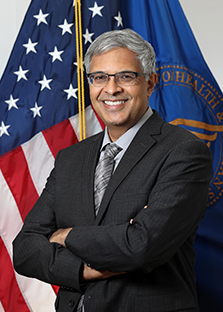NIH Director refines guidance for international research partnerships
September/October 2025 | Volume 24 Number 5
 Photo courtesy of National Institutes of HealthNIH Director, Jay Bhattacharya
Photo courtesy of National Institutes of HealthNIH Director, Jay Bhattacharya
The National Institutes of Health remains committed to its support of research collaborations with institutions and scientists outside the United States that help advance its mission. Over several months, NIH Director Jay Bhattacharya, MD, PhD, has discussed what NIH is doing to improve its oversight of funds going to foreign research institutions. Then in late August, he issued a statement, “Maximizing and Safeguarding NIH’s Investment in Foreign Collaborations,” to clarify the standards he’s set for research partnerships across borders.
In this statement, Bhattacharya references the mission of NIH to seek fundamental knowledge about the nature and behavior of living systems and to apply that knowledge to enhance health, lengthen life, and reduce illness and disability. Given the overlapping drivers of health and safety in different countries, NIH actively conducts and supports international, in addition to domestic, research, he writes. In fact, global collaborations can drive scientific progress to benefit all, including the American public.
Yet Bhattacharya also notes that “support of international research should deliver both scientific and taxpayer value.” Acknowledging that NIH is “tasked with being good stewards of U.S. taxpayer dollars,” he advises the agency to pursue collaborations “judiciously, acknowledging that risks may not always be immediately apparent.”
He emphasizes two overarching principles to guide NIH research partnerships abroad.
- All research supported at international sites should have a clear scientific rationale to be conducted in a foreign country rather than in the United States.
- All research supported at international sites should have direct potential to generate knowledge applicable to understanding, improving, or protecting the health of Americans.
Bhattacharya also cautions against misuse of NIH funding and resources, suggesting that it is of paramount importance to know exactly where “every dollar is going and to whom.”
He concludes, “NIH is not only a catalyst for science and health, but also a driver of U.S. economic growth.” International research projects, then, must also aim to benefit the American public.
More information
Updated November 17, 2025
To view Adobe PDF files,
download current, free accessible plug-ins from Adobe's website.